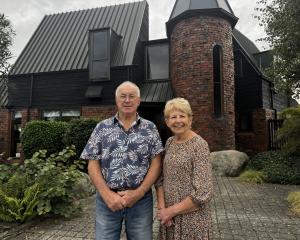
The company's chief executive Ed Harvey started the business after the engineer converted his 1997 Honda Accord to electric as a university project.
Over the past 10 years 8000 home and workplace chargers have been sold in New Zealand and Australia after it expanded there in 2023.
Evnex sees a sales environment emerging in its favour in Australia to repeat this performance over a far shorter timespan and this week released a further two chargers to the marketplace.
The E2 Core is a wall-mounted charger for EV owners feeling the economic pinch so they can charge during off-peak hours on the grid when power is cheaper or with solar energy.
While the E2 Plus is a premium version with colour options, longer cable and local load balancing which can be connected to a Tesla.
Harvey said sales prospects were strong in the Australian market as it was going through a significant energy transition at the moment.
‘‘We have sold 8000 chargers since the company was founded and we would be looking to do just about that again over the next 18 months.’’
He said Australia’s energy shift included more rooftop solar and wind generation being installed.
‘‘Australia has a huge focus on phasing out coal and gas generation. EVs actually marry up very well with that because it’s flexible the time of day an EV can be charged up and it can be overnight when wind generated or the middle of the day at work or home as there’s a lot of solar.’’
He said both nations could also be expected to be leading markets over the next couple of years for EVs made in China - the world’s leading EV manufacturer - as neither had an auto industry to protect and virtually no tariffs.
New Zealand buying of EVs fell off after the government scrapped the Clean Car Discount - from about 26,000 fully electric vehicles sold in 2023 to about 7500 last year.
Harvey said this government’s lower EV support had a large impact, but the movement away from fossil fuel vehicles was inevitable.
‘‘We are probably talking 12 to 18 months now before we start getting some of the EVs that are actually at price parity or cheaper than an equivalent combustion engine vehicle particularly with the new Chinese models that are coming.’’
At that point the the total lifetime ownership cost would come close to matching combustion vehicles with sales set to start increasing ‘‘exponentially,’’he said.
The company is the preferred charging partner for the likes of Volkswagen, Volvo, Skoda, Cadillac, Cupra, Subaru, and LDV in New Zealand.
Last May it secured investment from Adamantem Capital’s Environmental Opportunities Fund, which supported its expansion in Australia as well as upgraded manufacturing and new product development.
Evnex’s product range is based on its E-series home generation and X-series for workplace generation or homes with three phase power.
Harvey said the E2 Core was developed to provide a high-quality smart charger at a competitive price when affordability was on many EV owners’ minds.
‘‘The market research we’ve done ... shows the cost of an installed charger at home is overwhelmingly the biggest barrier for people and so this is a step in the right direction to address that challenge and that price barrier. The more homes we can get EV chargers into, the faster they charge and the more convenient the EV experience is going to be for people, we think the further it will push the industry ahead.’’
He said they were the slimmest wall mounted chargers in the world and their sleek, compact designs were because homeowners would soon be demanding better looking units.
‘‘They are designed to be really simple to use and are smart chargers. That means they are easy to set up that allow the homeowner to prioritise charging from either cleaner electricity whether that be when the grid is clean or from their own solar panels or from electricity that is cheaper.’’
The chargers deliver about 50 kilometres of range per hour, at least four times faster than a three-pin plug. Each charger has its own dedicated feed from the switchboard.
The E2 Core, selling at a launch price of just under $1000, and the E2 Plus for $1299 feature locally-sourced components.
Harvey said he was passionate about New Zealand manufacturing.
‘‘We need to do more in New Zealand. It’s very challenging to be competitive and we certainly find that finding the right talent in the Christchurch market is a real challenge at the moment and we definitely notice the brain drain. We are finding it more of an issue now than we have probably in the 10 years I started Evnex so it’s very noticeable we’ve had a lot of our smart, capable people head offshore.’’
The gap had been filled by some roles being hired in Sydney, but they remained passionate about hiring Kiwis and continuing to build products in New Zealand, he said.
Harvey. who was forced to sell the converted 1997 Honda Accord because he was time and cash-strapped in his university years, would like to buy it back ‘‘one day’’.












